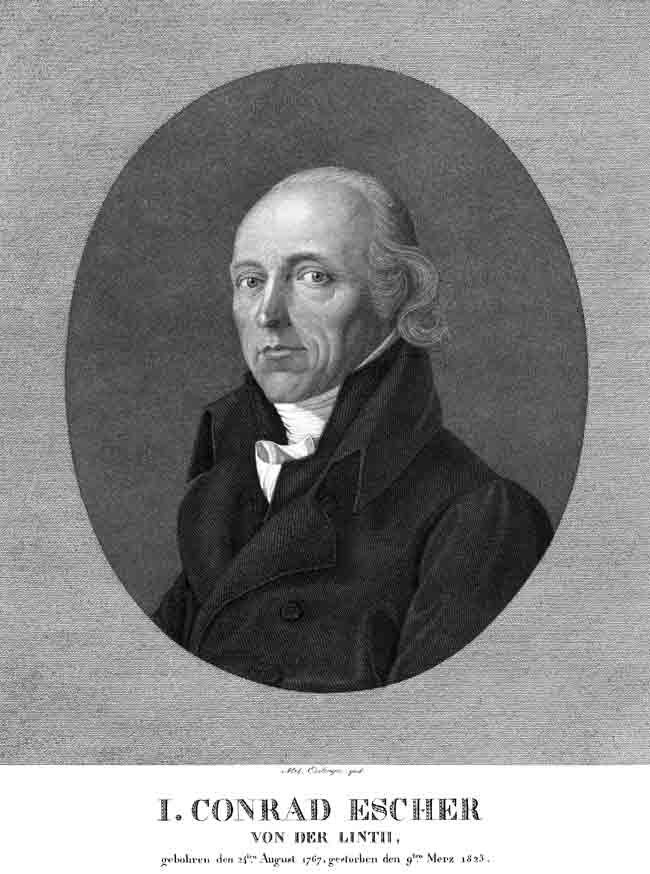The Linth - Escher - Foundation
| Home |
| Webdesign 2000 by Brandenberger© |
Last
update September 2014
|
Hans Konrad Escher
from Zurich belongs to the most important statesmen Switzerland has
ever seen.
His short life of only 56 years spreads over the dramatic time of
the french revolution (1789), the
helvetic revolution (1798), the period of the mediation (1803 - 1814)
and the installing of the new
constitution in Switzerland.
Eschers work is most typical for the period of "Enlightenment"
at the end of the 18. Century, comparable
with other great characters such as Pestalozzi, Lavater, Goethe and
others. Escher became therefore a
politician, teacher, humanitarian, scientist, manager and tradesman.
Lets have a short look at Eschers life:
 |
Hans
Konrad Escher von der Linth 24th August 1767 - 9th March 1823
Escher
was married to Regula von Orelli. They had 9 childern. Three
of them died at early childhood. Since Eschers only son Arnold
had no children, the added title "von der Linth" vanished.
This nobility was the only title ever given by Switzerland to
one The Eschers lived in the city of Zurich since 1385 |
Education and travels:
First education in Zurich. Visited Morges and Geneva in order to learn french, educated by Jean-Pierre Etienne Vaucher. Traveled to Paris, London, Holland, Germany, Austria, Italy and Savoy. Studied economy and basic science in Göttingen (Germany). Escher was very much influenced by Immanuel Kant and Jean-Jacques Rousseau.
Eschers income:
The
Escher family ran a textile business in Zurich, specialised on very
fine silk fabrics. Conrad Escher overtook the business from his father.
The business allowed him to remain completly independent.
Eschers career as a politician:
- 1796 appointed leader of the "Landeskommission". This treaty brought the much poorer country districts politically closer to the wealthy cities. Published with Paulus Usteri, a physician of Zurich, the "New Swiss Republican", a weekly newspaper and they installed for the first time in Switzerland a free, uncensured press.
- 1798 elected to the house of representatives. 1799 became president of the parliament in Lucerne (only 32 years of age!)
- campained for the amnesty of the political prisoners of the helvetic revolution
- was commander of the Zurich troops, defending the swiss frontier at Basle and Schaffhausen
- 1802 Escher was for a short period member of the Swiss Governement and served as minister of defense.
- from 1807 until his death 1823 was the leader and manager of the "Linth-enterprise", being the first national enterprise of its kind. This enterprise included the correction of the Linth river and the connecting of the two lakes Walensee and Zurichsee.
- 1814 elected to the Zurich parliament and to the Zurich governement
- was mediator in Sargans during their secession movement
-
Escher stayed until his death 1823 minister of education of the canton
of Zurich
Eschers teaching:
- Escher was 25 years old when he started in 1793 to give lectures in Zurich about economics, statistics, history, politics, geology and mineralogy
- founded 1793 the "Political Institute of Zurich"
- 1806 elected as professor and ordinarius for economy
Eschers scientific works:
- Escher was mainly envolved with scientific studies about geology and mineralogy
- made every year long trips through Switzerland. Many mountains were being climbed for the first time and many valleys were discovered by Escher. At the time nobody knew Switzerland better than Escher did. Left a diary of over 1400 pages. Walked incredible distances, 80 to 100 Kilometers were "standardl" walks of a day. Accomplished the walk over the Alps from Milano in Italy to Zurich in 4 days!
- was a very talented aquarellist. Left over 1000 works (drawings, panoramas, maps)
- bought the "Rahn Cabinett" for the city of Zurich. This collection became the basis of the scientific collection of the university of Zurich
Eschers public services:
- was leader of the "Knabenverein" in Zurich. Somewhat like boy-scouts today. The idea was to educate young boys mentally und physically
- was member and president of the "mahtematical-militarian society of Zurich"
- was member of the "Helvetic society", a philantropical and political society
- without taking any income Escher managed the Linth-enterprise until his death
- founded the "Bläsihof". A school with connected agriculture for orphans
- wrote many expertise about mining, hydrologics and road construction
- was a diplomat at the Vienna congress in order to negotiate the new Swiss boundary line
Eschers political influence had a major impact on Switzerland and is still felt today!